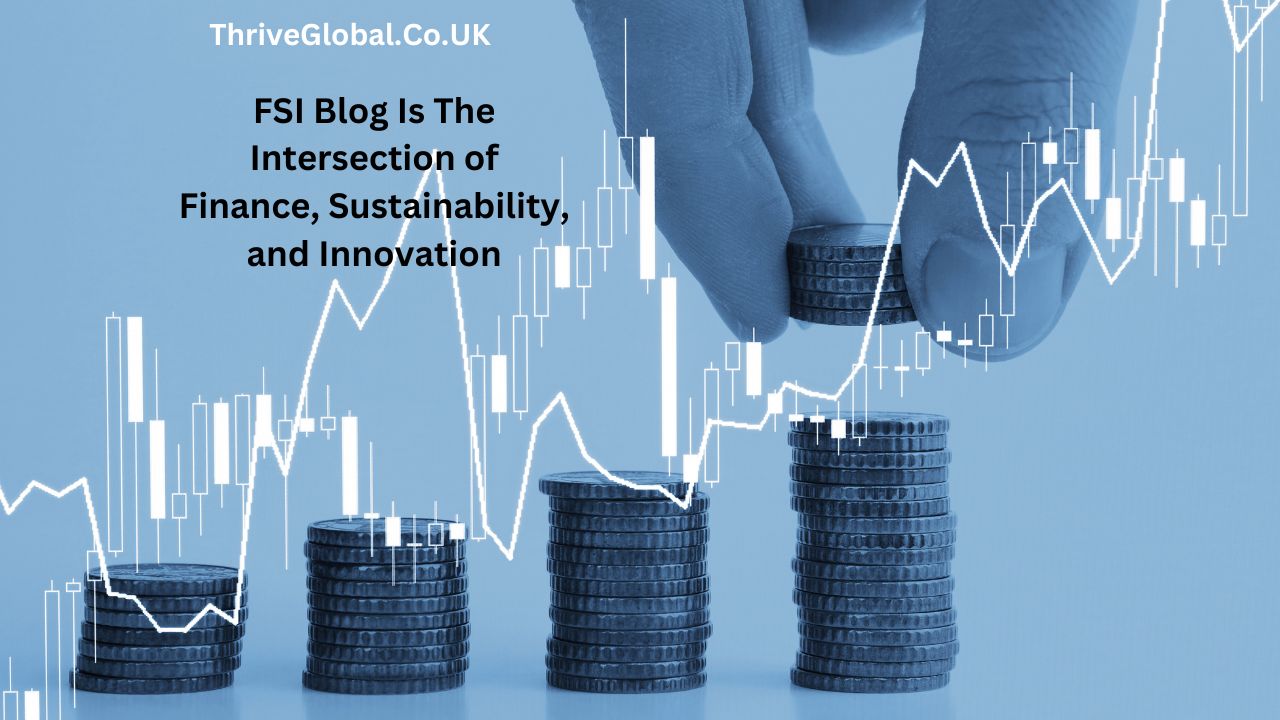FSI Blog is a dynamic online platforms that explore the confluence of finance, sustainability, and innovation. They serve as a hub for thought leadership, providing in-depth analysis, insights, and discussions on how financial strategies can be aligned with sustainable practices and innovative approaches.
By addressing topics such as green finance, sustainable investments, and technological advancements in the financial sector, FSI Blog highlights the importance of integrating environmental and social considerations into financial decision-making.
These blogs are essential resources for professionals, academics, and enthusiasts looking to stay informed about the evolving landscape where financial viability meets environmental stewardship and innovative solutions.
Table of Contents
ToggleFSI Blog: The Evolving Role of Finance
Sustainable Finance
Sustainable finance is reshaping the financial landscape by integrating environmental, social, and governance (ESG) criteria into investment decisions. Investors are increasingly aware of the long-term risks and opportunities associated with sustainability. By focusing on companies with strong ESG performance, sustainable finance aims to generate positive societal impact alongside financial returns.
Green Bonds and Social Bonds
Green bonds and social bonds are innovative financial instruments designed to fund projects with specific environmental and social benefits. Green bonds support projects like renewable energy, energy efficiency, and sustainable agriculture, while social bonds finance initiatives such as affordable housing, healthcare, and education. These bonds are attracting a growing number of investors committed to making a positive impact.
FSI Blog: The Importance of Sustainability
Corporate Responsibility
Corporate responsibility is no longer just a buzzword; it’s a vital part of modern business strategy. Companies are recognizing the importance of sustainable practices in building trust and long-term value. This includes reducing carbon footprints, promoting fair labor practices, and ensuring ethical governance. By aligning business operations with sustainability goals, companies can drive meaningful change and enhance their competitive edge.
Climate Risk Management
Climate risk management is becoming essential for businesses and investors. As climate change poses significant risks to economies and societies, companies must assess and mitigate these risks to ensure resilience and continuity. This involves analyzing climate-related financial risks, incorporating climate scenarios into strategic planning, and investing in climate adaptation and mitigation efforts.
Also Read: Vital-mag.net Tips For Mind and Body Wellness
FSI Blog: Innovation Driving Change
Fintech Revolution
The fintechzoom revolution is transforming the financial services industry through technology-driven innovation. From mobile banking and peer-to-peer lending to blockchain and artificial intelligence, fintech is making financial services more accessible, efficient, and inclusive. These innovations are also enabling sustainable finance by facilitating transparent and secure transactions, improving risk management, and supporting green projects.
Impact Investing
Impact investing is gaining traction as investors seek to generate positive social and environmental outcomes alongside financial returns. This approach involves investing in companies, organizations, and funds that address pressing global challenges, such as poverty, inequality, and climate change. Impact investors are playing a crucial role in funding sustainable development and driving progress towards the United Nations’ Sustainable Development Goals (SDGs).
FSI Blog: Success Stories
Tesla: Leading the Charge in Sustainable Innovation
Tesla is a prime example of how innovation and sustainability can drive financial success. By revolutionizing the electric vehicle market, Tesla has significantly reduced greenhouse gas emissions and set new standards for the automotive industry. The company’s commitment to renewable energy and battery storage solutions further demonstrates its dedication to sustainability.
Patagonia: The Business of Saving Our Planet
Patagonia, a leading outdoor apparel company, has built its brand around sustainability. The company prioritizes environmental responsibility through initiatives like using recycled materials, advocating for environmental causes, and promoting fair labor practices. Patagonia’s success shows that businesses can thrive while prioritizing the planet.
The Future of Finance, Sustainability, and Innovation
Integrating ESG into Mainstream Investing
The integration of ESG criteria into mainstream investing is set to continue growing. Investors are increasingly recognizing that ESG factors can affect financial performance and are demanding more sustainable investment options. This trend is pushing asset managers and financial institutions to develop new products and strategies that align with ESG principles.
The Rise of Sustainable Startups
Sustainable startups are emerging as key players in the innovation landscape. These companies are leveraging cutting-edge technologies to solve environmental and social challenges. From clean energy solutions to sustainable agriculture, startups are driving progress towards a more sustainable future. Investors and corporations are increasingly partnering with these startups to accelerate their impact.
Conclusion
The FSI Blog is a powerful force shaping the future. By embracing sustainable finance practices, companies can drive positive change while achieving financial success. Innovation, particularly in the fintech sector, is making it easier to implement and scale sustainable solutions. As we move forward, the continued integration of ESG principles and the rise of sustainable startups will play crucial roles in addressing global challenges and building a more resilient and equitable world.
Also Read: Fintechzoom Amc Stock: Risks and Rewards in the Current Market
FAQs
What is sustainable finance?
Sustainable finance involves incorporating environmental, social, and governance (ESG) criteria into financial decision-making to generate positive societal impact alongside financial returns.
How do green bonds work?
Green bonds are financial instruments used to fund projects with specific environmental benefits, such as renewable energy or energy efficiency. Investors in green bonds support sustainable development initiatives.
What is impact investing?
Impact investing involves investing in companies, organizations, and funds that aim to generate positive social and environmental outcomes, alongside financial returns. It focuses on addressing global challenges like poverty and climate change.
Why is climate risk management important?
Climate risk management is crucial as it helps businesses and investors assess and mitigate risks posed by climate change, ensuring resilience and long-term sustainability.
How are fintech innovations supporting sustainable finance?
Fintech innovations, such as blockchain and artificial intelligence, facilitate transparent and secure transactions, improve risk management, and support green projects, thereby enhancing sustainable finance practices.









